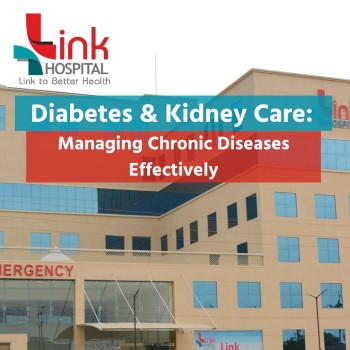Winter can bring its own set of challenges when it comes to health, from chilly temperatures to increased risks of flu and other illnesses. At Link Hospital, we understand the health hazards that come with the cold season and are here to offer expert advice on how to stay safe and healthy. By staying informed and proactive, you can protect yourself and your loved ones from common winter-related health issues.
Common Winter
Health Hazards
Winter introduces several health risks that
can affect your physical well-being. Understanding these hazards is the first
step toward prevention.
1. Cold-Related Injuries
Exposure to extreme cold can lead to injuries
like frostbite and hypothermia. Frostbite, which occurs
when skin and tissues freeze, usually affects the extremities such as fingers,
toes, and ears. Hypothermia happens when the body temperature falls dangerously
low, leading to confusion, shivering, and, in severe cases, unconsciousness.
2. Flu and Cold Infections
Winter is prime time for flu and cold viruses, as the colder air weakens our immune defences. These infections can leave you feeling miserable, with symptoms like fever, sore throat, and fatigue.
3. Slips and fall
Icy sidewalks and slippery surfaces
contribute to an increase in falls and fractures during the winter months.
Accidents can happen quickly, especially on frozen walkways, resulting in
injuries that require immediate care.
4. Dry Skin and Irritation
The cold, dry air coupled with indoor heating
systems can dry out your skin, leading to irritation, redness, and conditions
like eczema.
5. Seasonal Affective Disorder (SAD)
The lack of sunlight during winter can lead
to Seasonal Affective Disorder (SAD),
causing depression, fatigue, and irritability for many people, especially in
areas with long winters.
Expert Tips to
Prevent Winter Health Hazards
At Link Hospital, we believe prevention is key to staying healthy during the colder months. Here are expert tips to help you avoid winter health risks:
1. Dress Appropriately for Cold Weather
Layer your clothing to retain body heat. Wear
thermal base layers to keep sweat
off the skin, insulated outerwear
for wind protection, and warm
accessories like hats, scarves, and gloves to prevent frostbite and
hypothermia.
2. Protect Your Skin from Dryness
To prevent dry, cracked skin:
●
Use thick moisturizers after
washing your face or showering.
●
Apply lip balm to keep your
lips hydrated.
●
Avoid hot showers, as they can
strip the skin of its natural oils.
●
Consider using a humidifier
indoors to prevent dryness caused by heating systems.
3. Get Your Flu Vaccine
Vaccination is one of the most effective ways
to protect yourself from the flu. Link Hospital offers flu shots, and we
recommend getting vaccinated, especially for those in high-risk categories.
4. Eat a Healthy Diet and Stay Hydrated
Support your immune system by eating a
balanced diet with plenty of fruits, vegetables, and lean proteins. Don’t
forget to stay hydrated, as cold, dry air can lead to dehydration, which can
affect your skin and overall health.
5. Avoid Slips and Falls
Wear shoes with good traction, especially
when walking on icy or snowy surfaces. Walk slowly and carefully, and use
handrails when available.
6. Combat Winter Blues with Light Therapy
For those who suffer from Seasonal Affective Disorder (SAD),
light therapy can be a helpful solution..
7. Stay Active and Exercise Regularly
Winter doesn’t mean you have to stop
exercising. Indoor workouts, yoga, or even winter sports like skiing and ice
skating can keep you active and healthy.
How Link
Hospital Can Help
At Link
Hospital, we are here to support your health through the winter months.
Whether you’re dealing with cold-related injuries, respiratory infections, or
seeking treatment for dry skin or seasonal affective disorder, our expert team
is ready to help. We offer various services including emergency care, pulmonary
medicine, dermatology, and psychiatric support for those affected
by winter blues.
If you’re feeling any discomfort or symptoms,
don’t hesitate to contact us for immediate consultation or treatment. Our
Advanced facilities and expert
doctors ensure you get the best possible care.
Don’t wait for a problem to arise—take charge of your health this winter. Please book your appointment with Link Hospital today and ensure your well-being with our expert team of doctors and specialists. Your health matters, and we’re here to help you stay safe and warm all winter!











